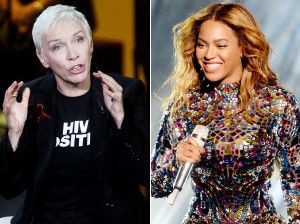What Does Twerking Have to Do With Feminism? Annie Lennox Desperately Tries to Stay Relevant by Insulting Black Feminists
 Photos by Stefania D'Alessandro/Getty; Jeff Kravitz/FilmMagic
Photos by Stefania D'Alessandro/Getty; Jeff Kravitz/FilmMagic It’s a much asked question in any movement: Who gets to decide who we are and what we stand for?
Humanists are still, and probably always will be, fighting about the things we support surrounding our godlessness. Civil rights, issues of racism and sexism, how to raise our children or whether it’s ethical to have them at all—there isn’t much we agree on outside our disbelief in the supernatural.
The LGBTQIAP+ movement has had more than one trifle trying to decide who gets to be in the group. First it was bisexuals who were being rejected as members of the community (and that one still comes up a lot more often than you’d think). Then there was concern that trans* folk would give us a bad rap with all those “normal” heterosexual people. Now we’re arguing about whether asexuals, a group who feel no sexual attraction at all, are really even oppressed in our overly sexualized society (hint: they are).
So it really shouldn’t surprise anyone that feminists haven’t gotten our definitions or teamwork down to a science, either.
In a recent interview with NPR’s Steve Inskeep, 80s pop star Annie Lennox decided it would be a good idea to let people know how she felt about Beyoncé and the fad of “twerking,” which is interesting since twerking is something Beyoncé doesn’t actually do.
About twerking Lennox said that it’s “not feminism. It’s not … liberating, it’s not empowering. It’s a sexual thing that you’re doing on a stage; it doesn’t empower you. That’s my feeling about it.” This was in response to a question about her previous comment that Beyoncé was “feminism lite.”
Lennox has managed to get a flurry of attention to promote her new album by insulting one of pop culture’s most powerful women, which was without a doubt her goal. No one just insults the Bey without an ulterior motive. But leaving aside Lennox’s petty attention-grubbing antics, her comments have spurred a lot of activity in online feminist spaces, giving renewed energy to the discussion of what feminism is and who gets to be a feminist.
Feminism, like all movements, has a long and torrid past, and any good feminist will tell you a lot of it isn’t pretty. White feminists have, for most of the existence of the movement, dominated the conversation and denied access to those deemed not worthy at the time. Women of color were widely left out of the suffragette movement, and the “lavender menace” was what we once called lesbian and bisexual feminists. These things were due to widespread and accepted racism and homophobia, which, like sexism, still exist and are still gigantic problems.
Third-wave feminism is working on those issues by employing the theory of intersectionality, which contends that there are many facets of our identities that can lead to oppression, and often they overlap. Being a woman is a different kind of oppression than being black, but both have a strong effect on the lives of black women, see? So while it would be inappropriate for a white feminist to identify as an intersectional feminist, intersectionality is a concept that’s taken hold among all activist communities, and a big part of intersectionality is supporting people within your own movement who also face other oppressions.
This is why Annie Lennox, a white feminist, dissing Beyoncé, a black feminist, is so problematic.
For Lennox to say, as if she were the definitive expert, that sexual performance is not feminism shows how far removed she is from current third-wave feminist theory, because the jury is still out on that one. Twerking, along with all sexual performances, can be both empowering and exploitive and are widely acknowledged as not mutually exclusive. In fact, the ways in which women present their sexuality and take it back from the male gaze is a popular topic with young feminists.
The real kicker is that in the past, Lennox herself has often displayed her sexuality in public, posing for photos in nothing but boots and a floppy hat, all while sporting a short cropped haircut to distance herself from her femininity. So why is this sexual performance empowering when Lennox does it, or when say, Madonna or Iggy Azalea do it, but not when Beyoncé, Rihanna, or Nicki Minaj do it?
Well, we can likely point to racism. White feminists (and white people in general) have been policing the lives and bodies of people of color for years, telling them what they can and can’t find liberating or empowering, and then being offended when told they are wrong. The controversy surrounding twerking (which, I’ll reiterate, Beyoncé doesn’t do, unless we’re now considering every slight gyration of the buttocks to be twerking), mostly has to do with the fact that a great number of white women really can’t do it, and therefore can’t adapt and apprehend the sexuality of it.
Of course, none of this answers the question, “What is feminism and who says so?” but maybe that’s the point: feminism is an individual experience with femininity and empowerment, with sexism and misogyny. When you really get into it, it’s a lot more complex than shouting a catchphrase like “Feminism is the radical idea that women are people.”
Lennox is welcome to her own opinions. If she doesn’t find twerking empowering, then she doesn’t have to do it, but if she wants to keep calling herself a feminist, then she needs to stop policing the feminism of other women.
After all, an important part of feminism is supporting other women, not cutting them down.
